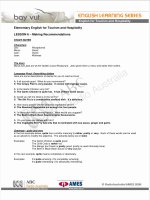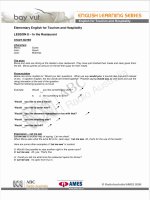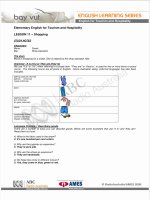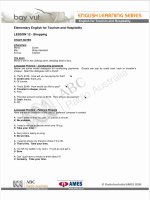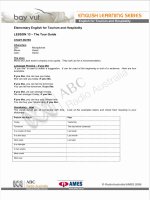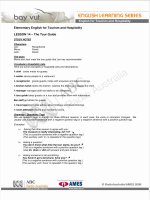English for today class 7
Bạn đang xem bản rút gọn của tài liệu. Xem và tải ngay bản đầy đủ của tài liệu tại đây (8.37 MB, 111 trang )
Unit one : Attention, please
2
Prescribed by the National Curriculum & TextbooK Board
as a Textbook for Class Seven from the academic year 2013.
ENGLISH FOR TODAY
Class Seven
Writers
M S Hoque
Raihana Shams
Md. Zulfeqar Haider
Goutam Roy
Md Abdur Razzque
Rozina Parvin
Editor
Abdus Subhan
NATIONAL CURRICULUM & TEXTBOOK BOARD,
DHAKA
ENGLISH FOR TODAY
3
Published by
National Curriculum & Textbook Board
69-70, Motijheel Commercial Area, Dhaka
[All right reserved by the publisher]
Trial Edition
First Publicatino : September 2012
Text Developement Coordinator
Mohammad Humayun Kabir
Computer Compose
Color Graphic
Cover
Sudarshan Bachar
Sujaul Abedeen
Illustration
Prohlad Karmaker
Design
National Curriculum & Textbook Board
For free distribution from academic year 2010 by The Government of Bangladesh
Printed by:
Unit one : Attention, please
4
Preface
The secondary curriculum has been revised in the light of National Education Poicy
2010, which emphasises learning English as an international language for
communicating locally and globally. The 'English For Today' textbooks have been
developed to help students attain competency in all four language skills, i.e.listening,
speaking, reading and writing.
The development ot cutrriculum, syllabud and textbook is a continuous process.
Incontinuation of it, this book has been developed and rationally evaluated by a group
of experts, which included curriculum specialists, subject specialists, teacher trainers
and classroom teachers. The contents and illustartions of this book have been
developed on order to suit the learners' age and cognitive level. In this book effective
communicative approach and techniques intehtrated with existing traditional methods
have been introduced. The book emphasizes practicing language skills through a
variery of meaningful and enjoyable activities.
The publication of teacher's guide id under process. The teacher's guide will help
teacher plan the lessons more effctively and teach students communicatively through
teacging learning activities.
My heartfelt gratitude goes to the curriculum developers, writers, illustators and
coordinator who worked under tremendous time constraints. Without their sincerity,
commitment and hard work, it would not been possible for NCTB to develop the
English textbook 'English For Today', making it available to teacher and students all
over the country by January 2013. As the textbook was developed within a very
limited time, there is room for further development. Attmpts have been taken to make
the book error free as far as possible. Any condtuctiva suggestion for the
improvement of the textbook will be welcomed and incorporated in future editions.
I also sincerel thank all involved in the production and publication of this textbook. If
used properly, the textbook will no doubt facilitate learning English at the desired
level.
Professor Md. Mostafa Kamaluddin
Chairman
National Curriculum & Textbook Board
Dhaka
ENGLISH FOR TODAY
5
Table of contents
Unit
Unit 1
Topic
Attention, please
Page
1-8
Unit 2
My Study Guide
9-14
Unit 3
15-23
24-40
Unit 5
What are frindes for?
People who make a
difference
Great Women to remember
Unit 6
Leisure
49-65
Unit 7
Games and sports
66-78
Unit 8
Likes and dislikes
79-89
Unit 9
Climate change
90-104
Unit 4
41-48
Unit one
Attention, please
Learning outcomes
After we have studied this unit, we will be able to
• follow instructions, commands, requests, announcements and act accordingly
• use sounds, stress and intonation
• ask and answer questions
Unit one : Attention, please
2
Lesson 1: In the classroom
A
Listen and say.
Teacher:
Students:
Teacher:
Students:
Teacher:
Students:
Teacher:
B
Good morning and welcome everybody.
Good morning, teacher.
Are you ready for the class?
Yes, teacher.
Have you got your new books?
Yes, teacher, we have.
Good! Please remember to bring your English book every day. And
speak English with me and with your classmates.
Read the conversation and act it out in pairs. Discuss this question with your
partner:
What does the teacher ask the students to do?
C
Now answer these questions.
1 Do you speak English with your teacher? If you do, when and how often?
2 Do you speak English with your friends and classmates? How often?
3 If you speak English outside the class, where do you speak it?
4 Do you watch any English programmes on TV? What programmes do you
watch?
Lesson 2: Outside school
A
Listen and read these short conversations.
1
Fahim
Tamim
: Can I borrow your pen, please?
: Yes, of course you can. Here you are.
ENGLISH FOR TODAY
2
B
: Could you please help me with my maths?
: Sorry, I can’t. I’m not good at maths.
3
: Would you turn the television off? I’m doing my
homework.
Brother
: Sorry, I didn’t notice that. Please go on with
your studies.
Complete these dialogues, using suitable words.
1
Radif
Rahin
Sister
A: _________ you lend me your English book for a day?
B: Sorry, I _________. I need to read it tonight.
2
A: Could you give me Tk 50?
B: Sorry, I __________.I have only Tk 20 with me.
3
A: ____________ you give me your calculator, please?
B: Yes, ____________ . ____________.
4
A: _________ you get me a notebook and a ballpen from the stationer’s?
B: Yes. Of course, I ____________ .
5
A: Can you put my box in the car, please?
B: Yes,__________ . I will.
C
Make requests, using the prompts.
1 You want someone to help you with the washing.
2 You want someone to give you change for a one hundred taka note.
3 You want someone to wait a minute.
4 You want someone to carry your bag.
5 You want someone to call you a rickshaw.
Lesson 3 : In the house
Key words : mop (v), mop (n), detergent
A
Listen and read the dialogue.
Mother
: Reza, will you come
here, please?
Reza
: Yes, Mum.
Mother
: Look. The kitchen is
very untidy. I want to
make it neat and tidy.
3
Unit one : Attention, please
4
Would you give me a hand?
Reza
: Sure.
Mother
: Could you take the pots and plates from the table and put them in the
cupboard?
Reza
: OK.
Mother
: First I’ll sweep the floor. Will you bring me a broom, please?
Reza
: Here it is.
Mother
: Thank you. Now I’m going to mop the floor. Could you get me a mop
and bucket and some detergent?
Reza
: No problem. Here they are.
Mother
: Thanks, dear.
Reza
: Welcome.
B
Act out the dialogue.
C
Match the sentences in column A with suitable answers in column B. Some
answers in B may match more than one question.
1
2
3
4
5
6
7
8
A
Would you read the shopping
list?
Will you go to the market,
please?
Will you buy me one litre of
cooking oil, please?
Would you buy me some rice?
Would you need some money?
Would you like some tea?
Will you switch on the TV,
please?
Would you tell her to watch TV
at 10 pm?
a)
b)
c)
d)
e)
f)
g)
h)
B
Certainly, I’ll do it.
Why? Rina is watching.
No, thanks. I have enough with
me.
Yes, I’ll.
Sorry, I can’t. I’ve left my glasses
in the study.
Yes, I’d love to.
What for?
OK. How much?
Now make a dialogue using the table and act it out.
D
Suppose your friends/relatives are coming to visit you. Write a dialogue
between you and your brother/ sister on making your room. You can use
words from the box.
take out
bring
push
move
hang (some pictures)
ENGLISH FOR TODAY
5
Lesson 4: In the street
Key word : crossroads
A
Listen and read.
Asif
: Excuse me! Could you tell me the
way to the railway station, please?
Passer-by : Oh, it’s not very far. Go along this
street and you’ll come to a big
crossroads. Turn left. Go along about
two hundred metres, and you will see
a tall building. Go past and the
station is on the right.
Asif
: Go along---come to crossroads---turn left---go about two hundred metrestall building --station on the right. Thank you very much.
Passer-by : It’s OK.
Note
B.
: ‘Excuse me’ is a polite way of drawing somebody’s attention.
‘It’s OK’: You can also say, ‘You’re welcome’.
Look at the map. Suppose you are now on Park Road and you want to go to
Mosque Road or Zila School. Ask your partner how you can go there. Start like
this:
S1:
S2 :
Excuse me. How can I go to Mosque Road?
Oh, it’s quite far ...................
6
Unit one : Attention, please
C
Work in pairs. Ask for and give directions for a place in your own upazila,
town or city.
D
Listen and practise saying these words.
station
building
crossroads
Lesson 5: At a bookshop
A
Look at the picture and answer these questions.
1 What is it?
2 Where can you find it?
3 Is there a bookshop near your house or school or in your upazila / town? Tell
about it.
4 Can you guess what the people in the picture are talking about?
B
Listen to the teacher / CD and answer the following questions.
Listening text: 1
1
2
3
4
5
6
What do you mean by ‘in stock’ and ‘out of stock’?
Who are talking in this conversation?
Where is the conversation taking place?
How many books does the student want?
What books does he want to buy?
How much do the books cost?
ENGLISH FOR TODAY
C
7
Work in pairs. One of you is a customer and the other is a shop assistant.
Make a dialogue saying the following sentences in the right order. Then write
the dialogue in your notebook and act it out.
• Thanks
• Hello. Can I help you?
• Yes. An eraser too.
• Fifteen taka, please.
• Here you are.
• Sure. anything else?
• Here is the money.
• How much?
• Can I have a pencil?
Lesson 6: In a restaurant
A
Answer these questions.
1 Have you ever eaten in a restaurant?
2 If yes, where, when and who with?
B
Listen to the teacher / CD and answer the following questions.
Listening text: 2
1
2
3
4
5
6
7
C
How many people are sitting at the corner table?
How many menus does the waiter bring them?
Why does Tuhin ask for a menu?
What is the waiter ready for?
How many items of food have they ordered?
Who wants some chips? How many of them will eat ice-cream?
Why does Mr Khan like mineral water—not any soft drinks?
Work in pairs. Write a dialogue between a waiter and a customer in a
restaurant, giving and taking orders for the following food items. When you
finish writing, act out the dialogue.
rice, fish curry, dal, vegetables, fresh juice and mineral water
Unit one : Attention, please
8
Lesson 7: At a railway station
A. Listen to the teacher / CD for the announcement at a railway station and answer
the following questions.
Listening text: 3
Questions
B
1
What’s the announcement for?
2
Where is the train going?
3
What platform will the Subarna Express stand at?
4
Where can the passengers buy their tickets?
5
Why shouldn’t a passenger travel by train without a ticket?
6
Where are the passengers asked to wait to get on the train?
7
What are the passengers asked to do to get to the platform?
Write a similar announcement for the passengers of a luxury bus at a bus
station. Give the passengers necessary instructions, including departure and
arrival times, place and time for lunch break, etc. in the announcement.
ENGLISH FOR TODAY
9
Unit 2
My study guide
Learning outcomes
After we have studied this unit, we will be able to
• look up words in a dictionary.
• read and understand the table of content pages.
Unit Unit
one : 2Attention,
My studyplease
guide
10
Lesson 1: Find your word
A
Read the dialogue.
Teacher
: Students, do you have a dictionary?
Rupa
: Yes, miss, I have one.
Ananda
: I have one too.
Teacher
: Do you know how to look up a word in a dictionary?
Rupa
: Not really. It often takes a long time to find the meaning of a word
in a dictionary.
Teacher
: How about you, Ananda?
Ananda
: Same with me. I often get confused. So many words, so many
signs, ooh!
Teacher
: It’s because you haven’t learned how to look up a word quickly in
a dictionary.
Rupa, Ananda
: How can we do it, teacher?
Teacher
: Ok, let’s start with a page from a dictionary.
ENGLISH FOR TODAY
B
11
Look at a dictionary page.
From Oxford Advanced Learner’s Dictionary
Unit Unit
one : 2Attention,
My studyplease
guide
12
C
Make a list of the letters/words in bold. Answer the following questions.
a. What do you see at the top left corner of the dictionary page?
b. What is the first letter and word in the left hand corner?
D
Read the text about how the dictionary page has been written.
The teacher asks the class, “Have you noticed that the words in bold are written
one after another? OK. Do you find any rule or system or order in arranging these
words?”
“Yes, teacher. The page starts with a single letter B and slowly words come
below this letter,” Rupa said.
“Thank you, Rupa. You’ve got it! Let me write B and some of the words from this
page on the board. Then I’ll show you how they are written one after another like
in the alphabet. Look at the board and ask me if it is clear or not. OK?”
E
Arrange the following words in alphabetic order.
bet
F
bat
bag
book
batch
Look at the dictionary page again. Discuss in groups and find out the
following information about BA, baby and bachelor.
• meanings of words (i.e. definitions)
• spelling
• examples of use/ example sentences
• grammatical information (parts of speech, irregular verbs and plurals,
countable or uncountable nouns)
• formal/informal
• abbreviations
Lesson 2: Find your chapter
A
bait
Listen and read the dialogue.
Rupa :
So….. Ananda, we had a
helpful class on dictionary
didn’t we?
Ananda:
Oh yes, very helpful. This is
why I like Mrs Barua’s class.
She is one of my favourite teachers.
ENGLISH FOR TODAY
13
Rupa:
She is! I also like her very much. And she is very organised. She knows
how to make us work in groups and pairs. So we are never bored.
Ananda:
By the way, I’ve another problem. Do you understand the ‘Table of
Contents’ at the beginning of a book?
Rupa:
Hmmm…yes, I’ve learnt it from my elder sister. I can try to explain it
to you, if you like.
Ananda:
So nice of you. I really need it.
B
Work in pairs. Discuss when and how you can help each other with anything
difficult in a lesson.
C
Read the text in the box below individually and work in pairs to answer the
questions that follow.
(taken from America 24/7)
Unit one
Unit: 2Attention,
My studyplease
guide
14
Questions
1. How many subjects / topics do you see here?
2. What do the numbers on the right-hand side mean?
3. Who do you think the people whose names are written after the subjects or
topics are?
4. What is each topic / subject called?
D
Fill in the gaps with appropriate words from the box.
read
and
of
books
book
are
topic
only
which
is
The text above is a table ……………………….…... contents. It shows what
subjects..........there in a ……….….., journal, magazine or in a research paper. So
what is included in a book ….……shown in its table of contents. The table also
shows a reader what the …………………….. are, who the writers are, and
……………..page a reader should open to …………a particular topic. Sometimes
in some ……………., topics are organised first in units .………….….. then in
lessons. However, some books ………..…… show the chapters.
E
F
Go to the text in the box at Section C and answer the following questions.
1
Who is the writer of America at Play?
2
Which chapter is written by Naomi Shihab Nye?
3
What is the page number for Sea to the Shinning Sea?
4
What does Robert Olen Butler write?
5
What is the chapter at page number 57, and who is the writer?
Work in pairs. Use your own English textbook. Ask and answer questions as
above to know about page numbers, topics, units and lessons.
ENGLISH FOR TODAY
15
Unit Three
What are friends for?
Learning Outcomes
After we have studied this unit, we will be able to
•
ask and answer questions
•
talk about familiar events
•
read and understand texts
•
write answers to questions
•
write short compositions
Unit one
: Attention,
please
Unit Three
: What
are friends
for
16
Lesson 1: Prize-giving day at school
Key words: eminent
A
outstanding
performance
Look at the picture and discuss the
following questions.
1. Who can you see in the picture?
2. What are they doing?
B
Read the text about a prize-giving
ceremony.
Farabi is Flora’s best friend. They live
in the same area. Also they are both in class 7. But they go to different schools.
It is a school holiday. Flora has come to visit Farabi. They are talking. Flora wants
to know about the prize-giving ceremony of Farabi’s school.
“Yesterday was our school prize-giving day,” Farabi says. “On this occasion our
school auditorium and its dais were brightly decorated. Prizes were also neatly
displayed on a separate table on the dais. All the students were present at the
function. Among others, the guardians and some eminent persons of the locality
attended the function,” Farabi continues. “The principal of PN College was the
chief guest.”
“When did the function start?” Flora asked.
“Oh, it started on time—just at 4 pm,” Farabi says. “Our Headteacher first read
out the annual report. Then the Chief Guest gave a short speech. He highly praised
the overall performance of the school and its excellent JSC and SSC Exam results.
Then he gave away the prizes among the students for their outstanding activities.”
“Did you get any prize, Farabi?” Flora enquires.
“Yes, I did,” Farabi replies. “I’ve got two prizes---one for regular attendance and
the other for good results in the last year-ending exams.”
C
Match words with their meanings.
Words
visit
ceremony
eminent
praise
outstanding
display
•
•
•
•
•
•
Meanings
speak highly of something or somebody
extremely good
go to see a person or place
put something in a place where you can see it easily
function
people having lots of power and influence
ENGLISH FOR TODAY
D
17
Ask and answer in pairs. Make questions and then choose answers from this
table.
Questions
How
What
Who
the prize-giving function
held?
was
did
In the school auditorium.
the auditorium decorated?
read out the annual report.
the chief guest at the
function?
brightly.
the Head teacher do at the
beginning of the function?
Where
E
Answers
The principal of PN college.
Complete the passage with the verbs in the box. Give their correct forms.
be
sing
speak
stage
At the end of the prize-giving function there ______________ a cultural show.
The students______________________________________ songs, danced and
_________________ a one-act play. It was so good that everyone
__________________ highly of it.
F
Do you have a sports day at your school? First tell the class about it and then
write about it in your notebook.
Lesson 2: Flora’s first day at school (1)
Key words: recall
A
add
chat
Talk about the picture and read the story.
Unit one
: Attention,
please
Unit Three
: What
are friends
for
18
Next week Farabi comes to visit Flora in her house. They are having a chat.
“Can you remember your first day at school, Flora?” Farabi asks.
“Oh, yes, I can,” Flora says. “I can recall exactly what happened. Would you like
to hear it?”
“I’d love to,” says Farabi. “Please tell me.”
“Okay,” says Flora. “It was 2006. I was then 6 years old. One day my mother said,
“Flora, you’re going to start your school tomorrow.”
I was very excited. I couldn’t think of anything else. I was always thinking about
the school, the teachers and the students of our school. I couldn’t even sleep well
that night.
The next morning my mother woke me up early in the morning. I had a bath and
put on my best clothes. Then I had breakfast and started for the school with my
mother.
The school was not very far from our home. So we walked all the way.
B
Say whether the following statements are true or false. If false, give the
correct information.
1
2
3
4
5
C
Farabi and Flora are talking at school.
Flora is talking about her school.
Flora first went to school at the age of 6.
Her mother dressed her in her best clothes.
Flora walked to school.
Fill in the blanks with suitable words.
Flora is a student. She is _________________ class 7. She can remember her
________________ day at school even today. She ______________ to school in
2006. Her mother _______________ her to school. The school was
_______________ a long way from their house. ________________ Flora
walked to school ______________ her mother.
D
Match the words with their meanings.
Words
chat
recall
exactly
excited
E
Meanings
precisely
feeling happiness
a friendly conversation
remember
Do you remember your first day at school? Write a short composition about
it answering the questions below.
ENGLISH FOR TODAY
19
1 How old were you at that time?
2 What is the name of the school you went to?
3 What did you put on?
4 How did you feel before you started for the school?
5 Who did you go with?
Lesson 3: Flora’s first day at school (2)
Key words : intelligent stare nervous
A
Read the text to know more about Flora’s first day at school.
Flora continues her story.
It took us half an hour to reach the
school. I saw many students on the
school campus. Some were playing and
some were talking to each other. I
didn’t know anyone. So I was a little
afraid.
My mother soon took me to the
Headteacher. He asked me a few questions and I answered them intelligently.
The Headteacher was very pleased. He put his hand on my shoulder and said,
“Good! You’re a highly intelligent child.
You know a lot. I’ll take you in my school. I hope you’ll be happy here.”
I was admitted to class 1. The Headteacher was a very nice person. He called a
teacher and said to her, “Ms Laila, this is Flora. She is a new student in class 1.
Take her to the class, please.”
Ms Laila took me to the class. The class teacher welcomed me and gave me a seat.
All the students in the class were staring at me. I felt a bit nervous to see all the
new faces. But soon I became easy. I could make friends with two or three
students sitting close to me.
A new place is a new experience. So my first day at school is a new experience in
my life. I will remember the day as long as I live.

